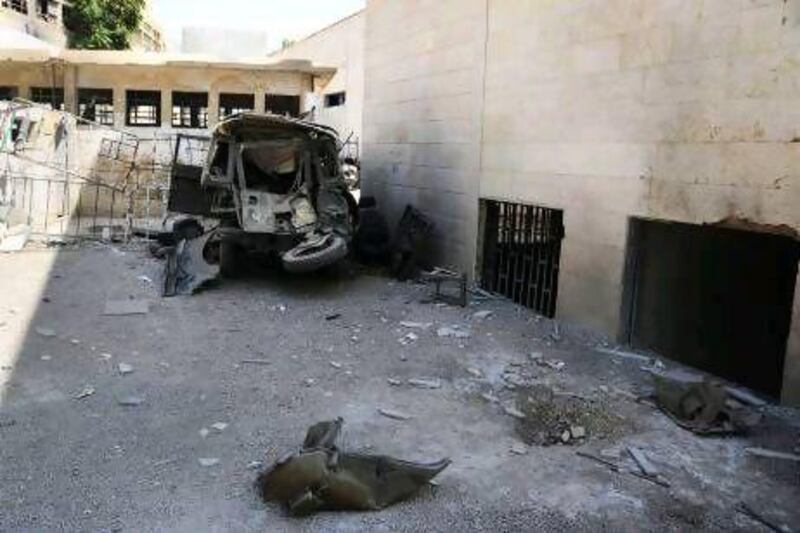AMMAN // Syrian rebels said they planted bombs inside the Syrian army's General Staff headquarters in central Damascus yesterday as President Bashar Al Assad's forces bulldozed buildings to the ground in parts of the capital that have backed the uprising.
Syrian state television said four people were wounded in what it called a terrorist attack on the General Staff compound in the highly guarded Abu Rummaneh district, where another bomb attack killed four of Mr Al Assad's top lieutenants two months ago.
"The operation targeted officers in the Assad army who have been planning and giving the go ahead for the massacres against the Syrian people," said a video statement by the Grandsons of the Prophet brigade, a division of the Free Syrian Army.
"Bombs were planted inside the army headquarters," said the video statement, which was broadcast on Arab satellite channels.
The bombings came on a day when two Syrian activist groups said about 5,000 people were killed in Syria last month, making it the deadliest month since the uprising began more than 17 months ago.
The Britain-based Syrian Observatory for Human Rights said that 5,440 people, including 4,114 civilians were killed in August.
The Local Coordination Committees, another activist group, said 4,933 civilians were killed in August.
Of those numbers, at least 1,600 people were killed in last week, the UN children's fund Unicef, said yesterday.
As the rebels demonstrated again yesterday that they could strike at the heart of the security apparatus, residents said army bulldozers moved on the Al Zayat and Farouk neighbourhoods to the west, and destroyed at least 20 buildings in Sunni Muslim areas that have sheltered the insurgents.
In the eastern Damascus neighbourhood of Hazza, footage taken by activists yesterday showed several buildings on fire. Opposition sources said the army had earlier stormed the area and summarily executed 27 young men.
"Any youth of fighting age seems to have been captured and killed," said activist Obadah Al Haj, who had fled the area.
As the uprising in Syria has spread, it has taken on a more sectarian bent, with activists saying Mr Al Assad's best trained forces from the mostly Alawite Fourth Division and the Republican Guards are spearheading the fight in the capital.
In the southern city of Deraa, which stands between Damascus and Jordan, troops continued rasing and bulldozing houses in the old part of the city for a third day after army shelling and aerial bombardment drove 40,000 people from there to Jordan.
Free Syrian Army fighters had left, their light weapons no match to the firepower of Mr Al Assad's forces, residents said.
"There are around 20 homes that have been demolished and 200 burnt," said Ahmad Abu Nabout, a resident of Deraa.
"Old Deraa is deserted. Troops cover up their looting by burning the homes or in some cases blowing them up," he said.
Another resident, Abu Anas, said: "Looking at the burnt and looted homes you would think these are rubbish dumps."
In other developments, an army assault on a rural area of the central Syrian province of Hama killed at least 21 people yesterday, the Observatory said.
It had no details available on whether those killed were civilians or rebel fighters.
"But all 21 of the dead were men," said the group's director Rami Abdel Rahman.
The watchdog gave a preliminary toll of 66 people killed yesterday across the country.
Also, yesterday, Syrian foreign ministry spokesman Jihad Makdissi told Lebanon's pro-Damascus television channel that Egypt's president Mohammed Morsi was too new in his post and did not fully understand Syrian politics after he publicly sided with the rebels.
"We heard the words of President Morsi. If I may say so, it was a disappointment," Syrian foreign ministry spokesman Jihad Makdissi said. "I think the new Egyptian presidency is not fully developed yet. In my personal view, his dose of reality will increase with the passing of time. We hope that he will be able to reach an understanding of the whole truth of what is happening in Syria, and to take a position at that level."
In a speech to the summit of the Non-Aligned Movement in Tehran last Thursday, Mr Morsi denounced the "oppressive regime" in Damascus, which he said had lost all legitimacy.
Newly appointed international peace envoy Lakhdar Brahimi is due to arrive in Syria soon, Mr Makdissi said yesterday.
"We will listen to him and he will listen to us," Makdissi said.
"The issue is not one-sided."
Veteran diplomat Mr Brahimi was appointed to replace former UN secretary general Kofi Annan as the UN-Arab League envoy to Syria after Mr Annan's six-point peace plan failed to stop the bloodshed in the country.
* Reuters, Agence France-Presse and the Associated Press





